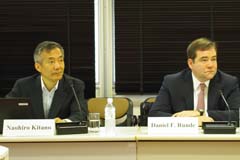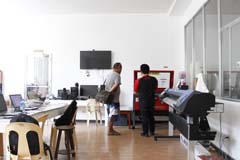First Joint Research with CSIS -- Aiming at 'Quality Growth' through Transformative Innovation
2015.08.17
In July 2015, JICA Research Institute and the Center for Strategic and International Studies, a prominent U.S. think tank, launched a joint research project under the theme of "Transformative Innovation contributing to sustainable development and poverty reduction in developing countries." This project is the first joint research between JICA Research Institute and CSIS.

Naohiro Kitano, JICA-RI deputy director
and Daniel F. Runde, CSIS Schreyer
Chair for Global Analysis
The countries of Asia have achieved their development into middle-income nations as the "world's factory" on the back of their competitive labor force. But in recent years, they have become mired in the middle-income trap of stagnant economic growth, and are now searching for a new path to growth. Technology, innovation and science will increasingly drive global economic growth. Both Japan and the U.S. are leaders in innovation grounded in science and technology. Solutions have been sought through innovation in poverty reduction and sustainable development as well.
This joint research aims at examining the potential for transformative innovation to resolve the issues faced by middle-income nations in Asia. In particular, its focus is on the potential of fab labs equipped with digital fabrication, and of safe and secure smart cities and communities where information technology is integrated into social systems.
Fab labs are facilities equipped with 3-D printers, laser cutters, and other kinds of tools that are freely available for use by local residents, and they aim at production for solving local or individual issues using shared data over the Internet. Fab labs in developing countries provide facilities and tools for direct use by the poor, so they are seen as a promising means for industrial development, employment, and thereby, poverty reduction.
For example, in the Philippines, a proposal by a volunteer from a Japan Overseas Cooperation Volunteer program led to the establishment of a fab lab in Bohol in cooperation with the Philippine Department of Trade and Industry, the Philippine Department of Science and Technology, Bohol Island State University and JICA. The Philippine Department of Trade and Industry supports local small companies and micro-enterprises through fab labs. Fab labs generated much attention when President Benigno Simeon Cojuangco Aquino III said he had high hopes that fab labs could promote industry and reduce poverty at an international conference held in Bohol in May 2014.

JICA helped establish a fab lab
in Bohol, Philippines
Smart cities aim at optimizing society and the community by integrating information technology into social infrastructure. Smart cities enhance social function with environmental consideration, sustainability and resilience. Smart cities require not only that the energy supply be optimized as in smart grid, but also that innovation and cooperation are made in wide areas including traffic, medical services and education. In Japan, Yokohama City, Kitakyushu City and other communities have promoted efforts toward building smart cities.
Along with economic growth, urbanization and suitable urban planning are major issues confronting developing countries. Smart cities have the potential to resolve these issues and lead to further economic growth.
The research project was launched with a conference on fab labs and smart cities held at JICA-RI on July 22 and 23, 2015. There are also plans for a conference at CSIS and field surveys in the Philippines and India.

事業事前評価表(地球規模課題対応国際科学技術協力(SATREPS)).国際協力機構 地球環境部 . 防災第一チーム. 1.案件名.国 名: フィリピン共和国.

事業事前評価表(地球規模課題対応国際科学技術協力(SATREPS)).国際協力機構 地球環境部 . 防災第一チーム. 1.案件名.国 名: フィリピン共和国.

事業事前評価表(地球規模課題対応国際科学技術協力(SATREPS)).国際協力機構 地球環境部 . 防災第一チーム. 1.案件名.国 名: フィリピン共和国.

事業事前評価表(地球規模課題対応国際科学技術協力(SATREPS)).国際協力機構 地球環境部 . 防災第一チーム. 1.案件名.国 名: フィリピン共和国.

事業事前評価表(地球規模課題対応国際科学技術協力(SATREPS)).国際協力機構 地球環境部 . 防災第一チーム. 1.案件名.国 名: フィリピン共和国.
scroll